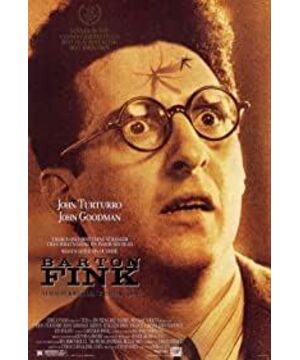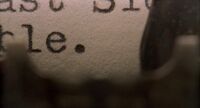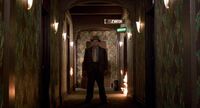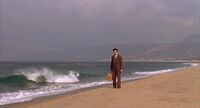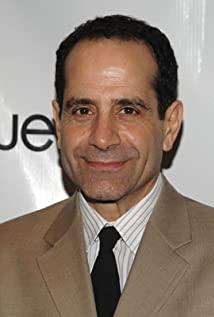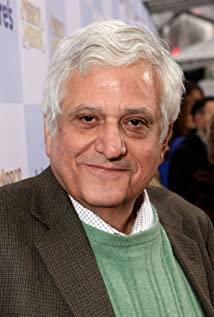This is a one-man movie. The film directly uses the name of the protagonist Barton Fink as the title of the film, and it has been pointed out that the film will start with this character. The film begins with Barton's play being staged in New York. When the rest of the staff are working step by step, Barton is the only one in a solemn suit, completely immersed in his own play. His body stiffened, his head held up proudly. This scene alone has revealed the pretentious character in Barton's bones. The director also gave Patton a pair of round black-rimmed glasses, exaggerated hairstyles, old-fashioned suits and other objects, making the image of a somewhat detached intellectual even more distinct.
But the Coen brothers wanted to represent Patton with more than just one character. Talking about ideals with friends in New York, he talks endlessly, and does not give the opportunity to let friends speak. It only shows the characteristics of Patton's pretentiousness and dedication to art. When Patton listened to his friend's suggestion and came to Hollywood in Los Angeles to work as a screenwriter, the director's good show of analyzing Patton for the audience was just beginning.
In Hollywood, Barton lived in an odd hotel, with a large and tall reception hall that reflected the small isolation of figures in the shadows. It has a deep corridor, plus dark wallpaper and dim lighting, giving the audience a mysterious and depressing feeling. But the weirdest thing is the wallpaper in Barton's room, which seems to have fallen off many times because of the hot weather, revealing the old and dark walls and slime. This should be a form of externalization of the protagonist Patton's inner world. When he was restless, lonely and helpless because he had no inspiration to write the script, this closed room externalized his inner world. The dark and long corridors and the falling out of stale wallpaper suggest the cowardice and emptiness beneath the shells of the characters.
The second protagonist of the film is Barton's neighbor Charlie in the hotel. Some film critics believe that Charlie is actually Barton's split alter ego in a lonely and empty environment. The author thinks this view is too absolute. It is better to say that Charlie's existence reflects the complexity of Barton's character and the director's own self-deprecation of his identity as an intellectual artist. with introspection.
In the first scene that Barton and Charlie met, Charlie used his generosity to draw closer to Barton. But the setting of Patton's position of standing and looking down at Charlie, and the contempt of Charlie in Patton's words, also pointed out that Patton's self-proclaimed intellectual and disdainful attitude towards ordinary people. Although he despised Charlie from the bottom of his heart, the loneliness of being in a foreign land made Patton have to tell Charlie his ideals of pursuing art and writing for the toiling masses. All he needs is a listener, so when Charlie is telling a story about a commoner, Patton interrupts him rudely. Patton is still immersed in his noble pursuits.
This relationship changes in the second half of the film. After Patton and Audrey spent the spring night together, the bloody incident of Audrey's tragic death by the bed made Patton panic and at a loss. Instead, Charlie helped Patton deal with everything, and then woke him up after Patton fainted with fright. At this time, Patton was completely attached to Charlie, as if he knew nothing, and that set of noble theories could not help him at all. Here Charlie's image is tall and sturdy, while Patton is a small bird.
The climax of the film unfolds when Charlie returns to the hotel again. Charlie's appearance made the entire corridor so hot that it burned. In the midst of the fire, Charlie looked down on Patton and berated his weaknesses—his detachment, arrogance and inability to listen. But Charlie becomes Patton's savior once again, freeing him from the entanglement of the police, where Charlie's strength once again contrasts with Patton's cowardice and incompetence. It is precisely because of the surreal passage that the fire burned the entire corridor, it makes people feel that Charlie is actually a split alter ego of Barton, one ego mocking the other.
The existence of Charlie allows the audience to see the weaknesses of Patton, and to see the contradictions and confrontations of Patton himself, just like the script of the wrestler's struggle against the soul written by him in the play. And this fantastical self-mockery and introspection is precisely the re-recognition of the film's author's identity by the Coen brothers.
There is a picture of a beautiful beach girl on the wall of Barton's room, which appears as the main body many times in the film, and every time it appears, it is accompanied by a distant sound of waves. Barton also looked at the beach beauty several times and fell into contemplation. By the end of the film, Patton saw a scene by the sea that was consistent with the scene in the painting, and he admired this beauty. It doesn't matter whether this scene is reality or fantasy, what matters is that appreciating the beauty of the creator is what Barton really wants to pursue, and he realizes this clearly at the end of the film.
View more about Barton Fink reviews


